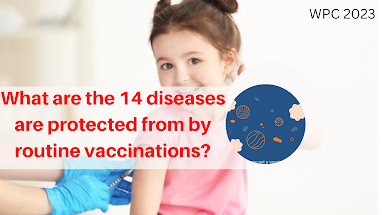What are the 14 diseases are protected from by routine vaccinations?
Polio
The poliovirus is the virus that causes polio, a debilitating
and potentially fatal viral disease. The virus can invade the brain and spinal
cord of an infected individual, leading to paralysis. It travels from person to
person. Through immunization
polio was eradicated in the United States, and this nation has remained
polio-free ever since.
Tetanus
Tetanus can be lethal and results in
excruciating muscle rigidity and lockjaw. Every time we scraped, stabbed,
scraped, or slashed ourselves on something metal as children, parents would
warn us about the dangers of tetanus. The tetanus vaccination
is now a component of the DTap vaccine, which fights illness.
The Flu
The influenza virus, which affects the nose,
throat, and lungs, is what causes flu, a respiratory infection. The immune
system, age, and state of health of a person can all have an impact on how the
flu affects them. Did you know that children of any age can be at risk from the
flu? Children with the flu may experience coughing, fever, pains, exhaustion,
vomiting, and diarrhea.
Hepatitis B
Did you know that complications from hepatitis
B cause more than 780,000 deaths annually in the world? Hepatitis B can be
transmitted by bodily fluids like blood. Since the hepatitis B virus can pass
from an infected mother to child at birth, it is highly harmful for newborns.
Hepatitis A
Since the 1995 development of the Hepatitis A
vaccine, the number of cases has been drastically reduced in the United States.
Contagious liver disease hepatitis A can be spread from person to person or by
tainted food and water. Vaccinating against hepatitis A is a good way to help
your baby stay Hep A-free and healthy!
Rubella
Sneezing and coughing
can transmit rubella. It poses a particular risk to a pregnant lady and her
unborn child. If a pregnant woman who has not had the rubella vaccine contracts
the disease, she runs the risk of miscarrying or losing her unborn child.
Hib
Because of immunizations, HIB is less
well-known than some of the other disorders. Hib can seriously impair a child's
immune system and result in mortality, brain damage, hearing loss, and other
health problems. Most children with hib are under five years old.
Measles
Did you know that your child might contract the
measles even two hours after a person who has the disease has left a room where
they have been? Measles can be dangerous and is very contagious, especially in
young children. Unvaccinated people can contract measles while travelling and
carry it into the United States because the disease is widespread in other
regions of the world.
Whooping Cough (Pertussis)
Pertussis, sometimes known as whooping cough,
is a seriously contagious illness that can be fatal to infants. Uncontrollable,
violent coughing brought on by whooping cough can make it difficult to breathe.
It gets its "whooping" appellation from the sudden intake of breath
that occurs shortly after a coughing spell. This condition can also result in
life-threatening breathing pauses in infants without any coughing at all.
Pneumococcal Disease
Streptococcus pneumonia is the bacterium that
is responsible for this illness. It is extremely harmful for kids since it can
lead to ear infections, sinus infections, pneumonia, and even meningitis. The
body's generally germ-free organs including the brain and spinal cord can
become infected.
Rotavirus
Most commonly affecting infants and young
children, rotavirus is contagious and can cause severe watery diarrhea,
frequently accompanied by vomiting, fever, and abdominal pain. The illness can
cause children to become extremely dehydrated, necessitating hospitalization. A
child who is severely dehydrated risks dying if proper treatment is not given.
One of the infant's first immunizations is against rotavirus.
Mumps
The most prominent symptoms of mumps are
enlarged cheeks and a jaw. The salivary glands' enlargement is to blame for
this. Fever, muscular and head aches, and fatigue are further symptoms. There
is no cure for the contagious illness known as the mumps
Chickenpox
A fever and itchy blistered skin rash are
symptoms of the illness known as chickenpox. Particularly in infants, adults,
and those with compromised immune systems, chickenpox can be dangerous and even
fatal. Even healthy kids can become seriously ill. Vaccinating children at a
young age is very crucial for maintaining their health.
Diphtheria
Due to the diphtheria
vaccine given to infants, the majority of us only have a vague understanding of
this ancient illness. The DTaP vaccine offers defence against pertussis,
diphtheria, and tetanus. Although it is preventable, diphtheria is still a
problem.
It may result in a thick coating in the back of
the throat or nose, making it challenging to breathe or swallow. Additionally,
diphtheria can cause mortality, paralysis, and heart
failure.

.png)
.jpg)
Comments
Post a Comment